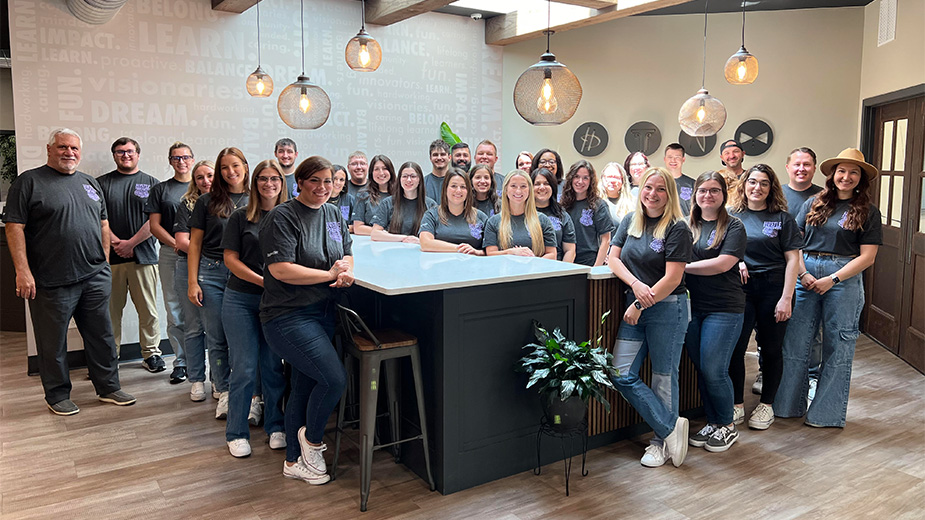The Way Station Makes Lifelong Impact
COLUMBIANA, Ohio — For more than 20 years, Timothy Colaizzi of Columbiana worked as a long-haul truck driver and was a driving instructor at TDDS Technical Institute in Lake Milton. But a few years ago, an adjustment in his health care changed that.
Colaizzi is diabetic. He gets his care through the Veterans Administration, which advised him that it would no longer cover the cost of Victoza, a non-insulin prescription medication for Type 2 diabetes. Instead, he was put on insulin, which effectively ended his driving career.
The Ohio Department of Transportation doesn’t permit insulin-dependent drivers, which are deemed an “unnecessary risk” because of the possibility of numbness in the feet or passing out from low blood sugar, he explains.
“Once they did that, I was done,” Colaizzi says. “I had no career, no job skills, no nothing.”
He was out of work for a few years, received unemployment compensation and couldn’t find a job. The market had changed since the last time Colaizzi had looked for work and he didn’t have the necessary soft skills, such as writing a résumé or preparing for an interview.
“I didn’t have any of those skills. I didn’t need them,” he says. “I had no idea how to get a job.”
To blow off some stress, Colaizzi and his wife, Laurel, decided to go out for a night on the town. They were having a great time, he says, “right up until that policeman pulled me over for a DUI.”
Part of Colaizzi’s sentence included community service, which led him to The Way Station in Columbiana.
He worked at DeVine’s thrift store inside The Way Station’s building at 769 Springfield Road. After satisfying his community service, he was hired there part time and enrolled in the organization’s Jobs Ready-Set-Go program. The six-week, 12-session program offers training in résumé writing, online job search, interviews, workplace integrity and communication.
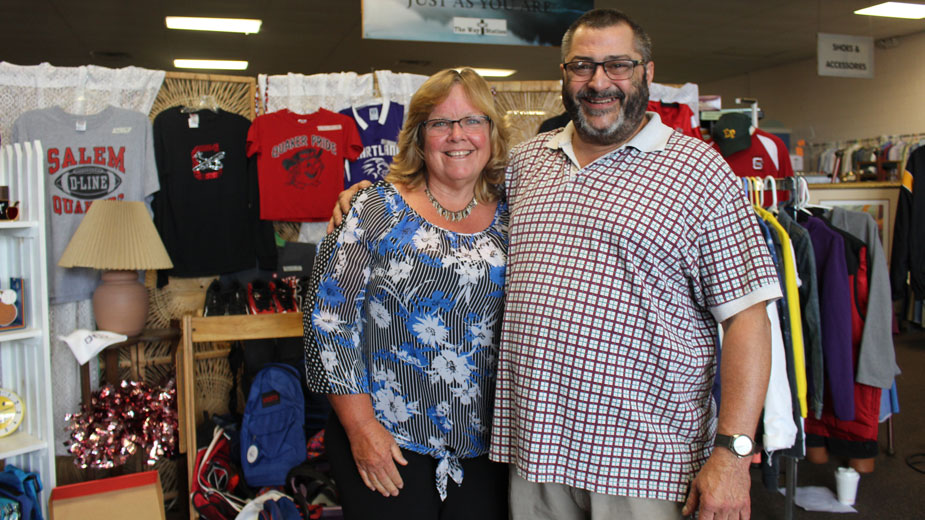
Timothy Colaizzi says Teresa Welton and The Way Station’s Jobs Ready-Set-Go program helped him find a full-time job.
Among the biggest advantages to the program are networking and connections, says its instructor, Teresa Welton. Area business owners and elected officials attend classes and meet with the students to help them identify their characteristics and traits that would be beneficial to a business, she says. It’s led to many “a-ha moments” when the students start to see the value they can bring to a career that they never considered before, she says.
“I can see it happen. It’s almost like a bud and you see the flower opens all of a sudden,” Welton says. “It’s what makes a difference in the class.”
For Colaizzi, the difference meant getting back on his feet with a full-time job, he says. A little more than a year ago, he earned his production technician certificate and took a job working as a press operator at PHD Manufacturing Inc. in Columbiana.
“It saved my life,” he says. “I don’t know what I would have done. I don’t know how I would have found a job.”
Jobs Ready-Set-Go boasts a 68% success rate, with some speakers offering jobs to students on the spot, Welton says. Others will come back later with job opportunities that could fit graduates. Classes are usually eight to 10 students and are held at the Columbiana store or at the county courthouse in Lisbon, she says.
Helping people find full-time work and be self-sufficient is part of The Way Station’s mission “to reflect the compassion of Jesus to individuals and families” who are struggling with poverty or joblessness, says its director, Vicki Ritterspach. It’s the same mission her father, Jim Couchenour, established 30 years ago when he founded The Way Station.
“He literally went to look for a friend who was struggling at a local bar. And then he just kept going back to the bar and talking to people, and people needed someone to talk to,” she says. “Out of that, this grew.”
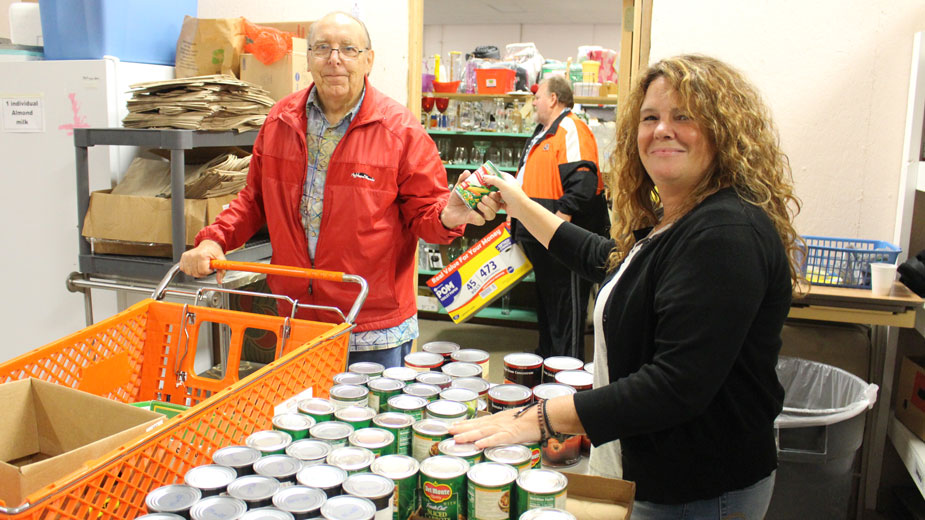
Vicki Ritterspach, executive director of The Way Station, distributes food to Hickory Gidley during one of the organization’s food drives, which are on the fourth Thursday of each month.
Ritterspach took over The Way Station in April 2010. In the last few years, she’s seen an uptick in cases of situational poverty, where people lose jobs and “find themselves where they thought they never would,” she says. Jobs Ready-Set-Go helps people working part-time in the thrift store through court-ordered community service, but she says the program is open to anyone.
While other organizations provide similar services, The Way Station is unique in that it addresses “the relational side” of joblessness, she says.
“When you need to get a job, social skills and emotional intelligence are very important,” Ritterspach says. “If someone has grown up not knowing how to look someone in the eye when they speak to them or interact in any really simple way, then they are held back from doing just about anything.”
Jobs Ready-Set-Go helped Karen McCowin overcome her own obstacles after hitting “rock bottom,” she says. When she first came to The Way Station, she was trying to get back on her feet as a single mother of a one-year-old son. After working there for a few years, she was charged with a Class 4 felony for trafficking marijuana.
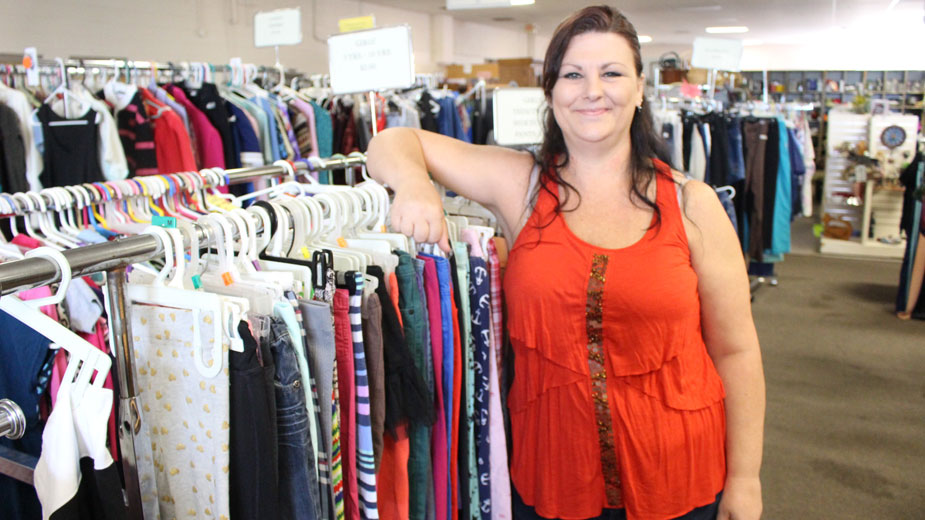
The Way Station helped Karen McCowin get back on her feet and overcome lifelong struggles.
She has eight months left on probation, is attending drug and alcohol recovery counseling sessions and passing drug tests, she says. The Way Station staff has continued to offer guidance and a place to work, which helped McCowin overcome a speech impairment she’s struggled with all her life. She’s become more social and is comfortable while working with the public, she says. She worked at The Way Station off and on for nearly nine years until finding a job at Ricky’s English Pub in Salem.
“I feel that I am at the best that I have ever been. I never want to go back to that life ever again,” McCowin says. “I am happy, I am raising my boy by myself and it’s great. I am proof that it does get better. You can do anything if you want it bad enough.”
Now living in Salem, McCowin is pursuing a job at the Goodwill there. “I am really hoping that I get in there because it’s the dream job that I have been working toward for 10 years,” she says.
Impact Maker
Greg Bowman, Community Garden volunteer
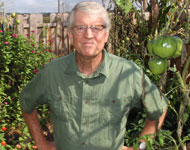
Bowman Helps Connect People to Their Food and to Each Other
In late September, the community garden at The Way Station is in full bloom. Zinnias and marigolds add bursts of color to the raised beds that are lush with vegetable plants, including cucumbers, peppers, golden chard and ripening heirloom tomatoes.
It’s the result of two years of work led by Greg Bowman of Salem, who volunteers at the Columbiana-based nonprofit organization’s office at 769 Springfield Road. A journalist by trade, Bowman wrote about agriculture for The Salem News as well as New Farm Magazine for the Pennsylvania-based Rodale Institute. The latter focuses on organic farming.
As a writer, Bowman learned about independent farmers and how they cared about the treatment of land and people, he says. Out of that grew an interest in gardening.
“I became more and more interested in how land and people and food and farming interact,” he says.
Working in a community garden increases one’s engagement with plants and other people, he says. Along with being a way to make new friends, it helps people get in touch with how plants grow and where food comes from, he says.
“There are some life lessons that grow out of that in a spiritual way as well,” he says.
Bowman works with some congregational gardens in Pennsylvania, helping people who have disabilities. Three years ago, he approached Vicki Ritterspach, director of The Way Station’s Columbiana site about volunteering there and starting a garden for the clients and staff.
An initial gift from the Grace Church of Columbiana led to the organization obtaining a $5,000 grant from the Columbiana Community Foundation. The funds paid for the hardscaping, fence and benches to help make the garden a “very welcoming place,” Bowman says.
From there, the organization worked to install four raised beds made from reclaimed wood, as well as soil, seeds and seedlings. Bowman uses vertical trellising to give the plants as much exposure to sun as possible.
The garden was built near The Way Station’s front entrance to encourage customers and visitors to take a look, he says. Despite the fence, passersby can see the climbing lima beans, “which got bigger than I could have ever imagined,” and broomcorn swaying in the breeze.
“It’s been my hope to make this kind of a sacred space where people can come and feel welcome,” he says. “They can take a break here, they can sit in the shade on the benches, they can talk or they can just have some time to themselves.”
Each spring, gardeners are allotted a 4-by-4 foot space to grow vegetables or flowers. No gardening experience is required because they are all learning together, he says. It creates a “very hands-on opportunity” for the people coming to The Way Station for programming, and gives staff another way to connect with them, he says.
Food from the garden is distributed on Wednesday evenings as it comes available and Bowman educates visitors and gardeners on what food is in season throughout the year. He says the garden provides a spiritual connection as well, coinciding with The Way Station’s mission “to display the love of Jesus Christ in practical ways to individuals, families, and communities,” according to its website.
Every Monday morning, the garden is used for a regular vesper, or prayer service. Each service lasts for about 30 minutes as staff and clients arrive before work.
“We usually use something happening in the garden as a bridge to something in our own lives,” Bowman says. “This is mostly for an experiential garden. It’s more just a chance to share the abundance that God gives us.”
In addition to helping people get a fresh start, the thrift store offers reduced price clothing to low- to no-income individuals and families. The organization also provides emergency assistance kits, twice monthly diaper distribution and monthly food distributions at both the Columbiana and East Liverpool locations.
“We find people who wander in and sit at the table just because they’re lonely and don’t have anyone else,” says Tammy Blackburn, director of the East Liverpool store at 125 West Fifth St.
Blackburn says the need for services is greater in East Liverpool, which serves about 150 families with monthly food distributions. The U.S. Census Bureau reports that 26.3% of residents in East Liverpool live below the poverty level, compared to 15.4% statewide. To help break the cycle of generational poverty, The Way Station is introducing its Pathways to Independence program this October.
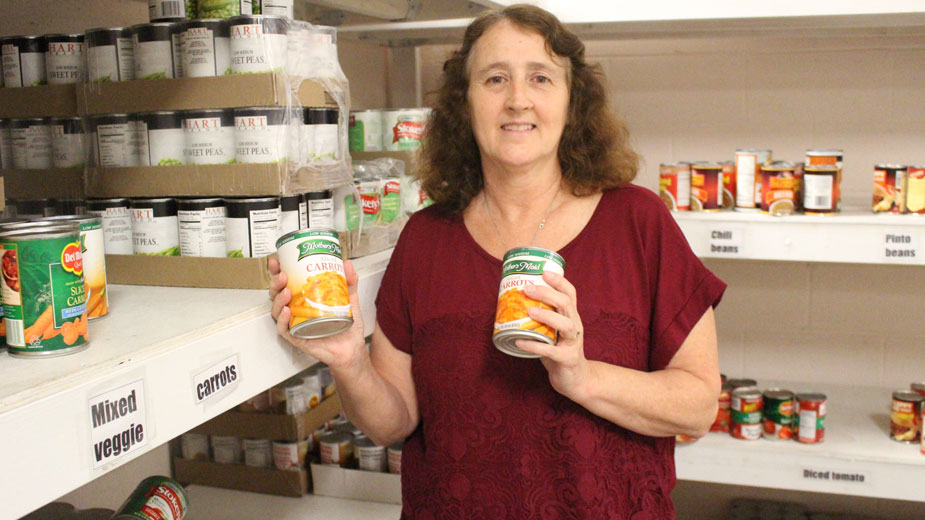
East Liverpool has greater need, says Tammy Blackburn.
The idea came about when residents became too reliant on the organization’s payment assistance program for expenses such as rent or utilities. Clients would come once every six months for the assistance, but instead of being temporary, “It became a part of their everyday routine,” she says. “We wanted to make a bigger difference in people’s lives.”
Pathways to Independence features a curriculum of classes to help people build their resources to get themselves out of poverty, Blackburn says. Participants must commit to a year-long program that includes other incentives as they progress.
“Our role is to come alongside them and encourage them – to help them come up with those ideas of their own goals, but be there to support, encourage and offer ideas,” Blackburn says.
Applicants are restricted to Columbiana County residents, she says. Ideal candidates have a child in the home and fall within 150% of the poverty level. In addition to classes, the organization will help connect residents with local and county resources.
“When you are in that cycle, it’s not just a lack of money. It’s a lack of a lot of different resources,” Ritterspach says. “Our goal is to help people find the resources they need to make the life-long changes.”
The Way Station’s programming is funded by donations and the occasional grant. The Simply DeVine Gala & Auction provides “a good amount of our operating income.” The eighth annual gala is Nov. 3 at The Links at Firestone Farms in Columbiana.
How You Can Help
Community members can make a positive impact on The Way Station through monetary donations or by volunteering for its programs.
Online donations can be made by going to The Way Station’s website, TheWayStationInc.org, and clicking the green ‘Donate Now’ button. Donors can contribute by making one-time, weekly or monthly donations, or by purchasing event tickets or taking part in raffles.
The next event is the eighth annual Simply DeVine Gala & Auction on Nov. 3 from 6 to 9 p.m. at The Links at Firestone. Tickets are $40 apiece. Current raffles include Ohio State football tickets and a chance to win a week’s stay at a condo in St. Petersburg, Fla. Tickets for both raffles are $10 apiece and winners will be drawn at the gala.
Businesses can also sponsor the DeVine Gala with packages ranging from $500 to $10,000. Residents are encouraged to check The Way Station’s website for other events throughout the year.
Copyright 2024 The Business Journal, Youngstown, Ohio.

